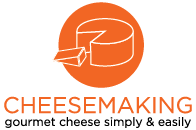Dosage and pack size
· Large size (10 Doses) will inoculate up to 2500 litres of milk (foil sachet) (25g $36)
· Small size (1.6 Doses) will inoculate up to 400 litres of milk (screw cap bottle) (15g $16
Add ¼ to ½ drop spoon to 8 litres of milk. Less or more can be applied depending on the intensity of flavour required
DH can be used for any variety of soft cheese and hard cheese
Benefits of using DH
- DH contains Debaryomyces hansenii
- DH can be used independently or in conjunction with white mould, Geotrichum, blue moulds and all Aroma and Ripening Cultures for a more complex flavour profile
- DH produces nutty, malty, and cheesy with some cooked cabbage notes. It is the most significant of aroma cultures for flavour development
- DH is an average de-acidifier (not as good as CU 77), fast growing, unlike CU77, DH grows only slightly in the paste of the cheese but is the best for growing well on the surface where it is more salt resistant than CU
- DH is an activator culture, which is very effective at stimulating other lactic and flavour cultures at the start of the maturation process
| Strain | KL | CU | DH |
| Species | Kluyveromyces lactis | Candida utilis | Debaromyces hansenii |
| Fermentation: | |||
| Glucose | + | + | – |
| Lactose | + | – | – |
| pH neutralisation | + | +++ | ++ |
| Aroma development | +++ | ++ | + |
| Growth: | |||
| Surface | +++ | +++ | +++ |
| Cheese Matrix | +++ | +++ | + |
| Temperature: | |||
| Optimum | 30⁰C | 21-30⁰C | 25⁰C |
| Growth 12⁰C | slight | slight | slow |
| Growth 4⁰C | none | none | none |
| pH optimum: | 4.5 | 5.5 | 5.8 |
| NaCl: | |||
| Optimum | 2% | 1 – 4% | 1 – 4% |
| Growth 4% | ++ | ++ | +++ |

